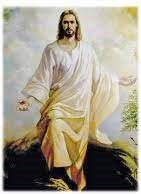The Introduction
God doesn’t rule over the dead but is Lord of the living. So the question remains: Are we dead or alive? Moses once posed two alternatives at the edge of the promised land: “I will place before your Life and Death, Blessing and Curse. Choose life so that you and your children will live” (Deuteronomy 30: 19). Life means embracing the freedom of the children of God. Death is mere existence governed by the shadowy values of a passing world. Most of us aren’t as free as we could be. We’re chained to the expectations of a society we claim has no hold over us. We’re not yet children of the age to come.
But we can move in that direction. We can stop defining ourselves in terms of material success or failure, physical attraction, popularity and possessions. We can start living by beatitude values, sharing more in common with saints and angels than the faces smiling out of every noticeboard and commercial. Like the Sadducees in the gospel, we may try to impose upon God the petty systems we hold dear. But God lives by different rules and they outlast ours.
How alive are you? What aspects of your current life are “dead” to the age to come?
The Scripture (Luke 20: 37 – 38) The Question about Rising from Death
Some Sadducees came up to Jesus. This is the Jewish party that denies any chances of resurrection. Jesus said, “Even Moses exclaimed about resurrection at the burning bush, saying, ‘God: God of Abraham, God of Isaac, God of Jacob!’ God isn’t the God of the dead, but of the living. To God all are alive”.

The Connection
Traditional etiquette says that you never discuss politics or religion in polite circles. This week’s Gospel is all about arguing religion in a not-so-polite circle. The Sadducees were trying to test Jesus’ knowledge and trick him into a wrong answer. In the end they had to admit he ‘answered well’. Just how should we speak about our Catholic beliefs at work, at social gatherings or even to a stranger who asks us a faith question?
What do we say when someone asks, ‘What do Catholics believe about divorce?’ or ‘Why do you believe it’s a sin to miss Mass on Sunday?’ As Catholics, we have a well-written and handy resource that was intended for just this purpose. The Catechism of the Catholic Church should find its way into every Catholic home.
For many of us, the last time we attended a religion class was in high school. A lot has changed since then, both in the Church and in our own lives. Jesus was ready with answers when the Sadducees questioned him. Perhaps it is time we boned up a little on our faith. That way, the next time someone asks us what we, as Catholics, believe, we will have a ready answer.
The Commissioning
Number us among your faithful people, O God.
Ready for the roller-coaster of learning, prepared to relentlessly question ‘the way it has always been done,’ never satisfied if people are suffering and authorities are complacent, ready to build community as a base for venturing out, looking always to Jesus, who took nothing for granted.
GPBS © (2022)